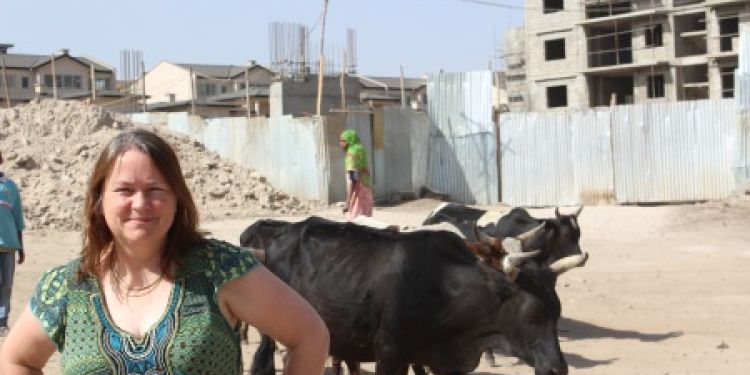
Hi! My name is Lorna MacIver and I'm from the USA. I grew up in the San Francisco bay area in California but I lived in Medford, Oregon for 20 years before going overseas. Now I make my home in Addis Ababa, Ethiopia.
When and how did you decide to move to Ethiopia? Is it complicated to settle down there?
My husband and I are international teachers. Last year we were searching for new jobs in a country we'd never been to before. We were thinking more in terms of Europe or Asia. Then we met the director of Addis Ababa's international school at a job fair and we got the idea that Africa would be an exciting adventure and that the school would be a good fit for both us and our daughter.
Moving here can be a bit complicated. As with a lot of places, there are layers of bureaucracy that are very opaque to foreigners. But our school has been extremely helpful in managing the red tape.
Have you ever lived abroad before? How many countries have you lived in or visited?
I loved to travel when I was young, but my family stayed close to home while the older children were growing up. When my husband retired two years ago we grabbed the opportunity to see more of the world. Our first overseas jobs were in Syria, where we moved with our youngest daughter in 2011. Sadly our school closed because of the civil unrest after we had been there only five months. We bummed around for a few months before landing in Bosnia last spring. Now that we are in Ethiopia we hope to stay put here for a few years.
Besides the US, I have visited 29 countries, and I have lived in three of them.
What do you like the most about Ethiopia/Addis Ababa?
That's a tough question because there is so much to like. Ethiopia has a long and fascinating history that I am just starting to learn about. The people are wonderful; they are genuinely friendly and helpful. Tourism here is really just getting started and there is very little commercialism. It is safe and stable. The countryside is very beautiful. And I love the food.
How is/was the cultural shock? What are the main differences with USA, your home country?
There was a lot to get used to at first. Addis is a big city with crazy traffic, lots of construction, air pollution. Services are often unreliable. Everything seems to take longer than what we were used to in the USA. There is a lot of visible poverty and illness. There are farm animals everywhere, even in the city. But we moved abroad to learn about and to enjoy the differences. The culture here values relationships more than time; I like seeing the cattle pass by my apartment; driving here is like playing a video game. If you don't let things get to you, and if you get involved in community service, you learn to appreciate many of the differences, and to help overcome some of the others.
Do you miss anything from your homeland?
Besides my family in the US, the things I tend to miss most are the edible ones. I love to cook and a lot of what I consider to be basic ingredients are hard to find. Nuts, chocolate, fresh herbs, cheeses, good bread. But now I'm growing herbs on the balcony, baking my own crusty bread, and starting to make my own cheese. And (if I didn't mention this already) Ethiopian cuisine is delicious.
Any 'memories of an expat' you would like to share with us? Your best souvenir? Or maybe your worst experience?
The hardest thing I've experienced as an expat was when our school in Damascus, Syria was forced to close because of the increased risk of violence there. We never felt we were in physical danger, but it was uncomfortable to have our movements and communication become increasingly monitored and restricted (no blogging from Syria!). It was hard to keep morale up at work with so many expat students and their families leaving for home. Our school administration was great and helped the teachers in many ways but we were all very sad to have to close the school and leave the country. Things have gotten much worse in the year since our departure; I worry about our friends still in Syria and can only hope that peace will come soon. I hope to return to Damascus someday.
What does a typical day as an expat in Ethiopia looks like?
It's hard to say what's typical. But chances are most expats start the day with some delicious Ethiopian coffee – this is the country where coffee originated, after all. Then it's off to work, either in our own cars or in the ubiquitous blue and white taxis. Many expats work for embassies or NGOs, or are teachers like us; others are here with private businesses but I would say most expats are involved in some kind of community service work, whether or not it is their official job. Most expats here have household help: housekeepers, guards, gardeners, drivers, and nannies staff many homes, so part of the day is spent in working with those employees. The weather here is beautiful for much of the year; the heavy rains come in the summer months, but even then it is not cold and the country is beautifully green, so it is nice to find reasons to spend time outdoors. Meals here are leisurely; street food and fast food are not part of the culture, but dining out in restaurants is a popular thing to do, and there are plenty of bars as well. On the weekends live Ethiopian music and jazz are popular, and there are frequent art shows and gallery openings.
There are a number of expat groups in Addis for different interests: there is a chorus, and a drama group, a women's club, and yoga classes. Some expats buy memberships to use the pool at the Sheraton or the Hilton, or they go running in the hills outside the city. Whatever you like to do, chances are you can find like-minded expats here to share the experience.
When did you start your blog? For what reasons?
I started my blog mainly as a way to process my own experience. I love to write but I lack discipline, so making it public was a way of keeping myself on task. It's like going to an exercise class where the other participants give you a hard time if you don't show up. My blog is also a way of keeping in touch with friends and family back home. I didn't used to think I cared if anyone else read my blog, but now it makes me feel pretty good that my readership is expanding to people I've never met before.
Did you make new friends with your blog?
I've made a few, mostly folks who are planning or thinking about moving to Ethiopia. I enjoy corresponding with them; I like to think maybe someone can learn from my mistakes!
Why did you register on https://www.expat.com and what do you think of the website?
Blogs are a great way to get a realistic first-person view of what a place is like. Travel sites often omit the negatives, or they have something to sell. I registered with Expat Blog when we accepted our first overseas jobs. I ran across it when I was searching online for information about moving to Syria. I found a great blog on the site written by an American expat who loves to cook like I do; I sent the author an email and she was a huge help advising me what to ship for my kitchen and what to leave behind.
Expat Blog is means of building community among a group that is by definition spread all over the world. I learn about places I'm already planning to go and I discover others I might like to visit someday. There are so many great expat blogs here to enjoy: informational blogs, funny blogs, blogs with fantastic photos.
Which advice would you give to the other Expat blog members who would like to settle in Ethiopia?
Go into it with an open mind. Some things about living here are difficult and tiring for someone from a more developed country. But if you stick with it, the rewards will make the hard parts worth it. And send me an email if you have any questions!



















